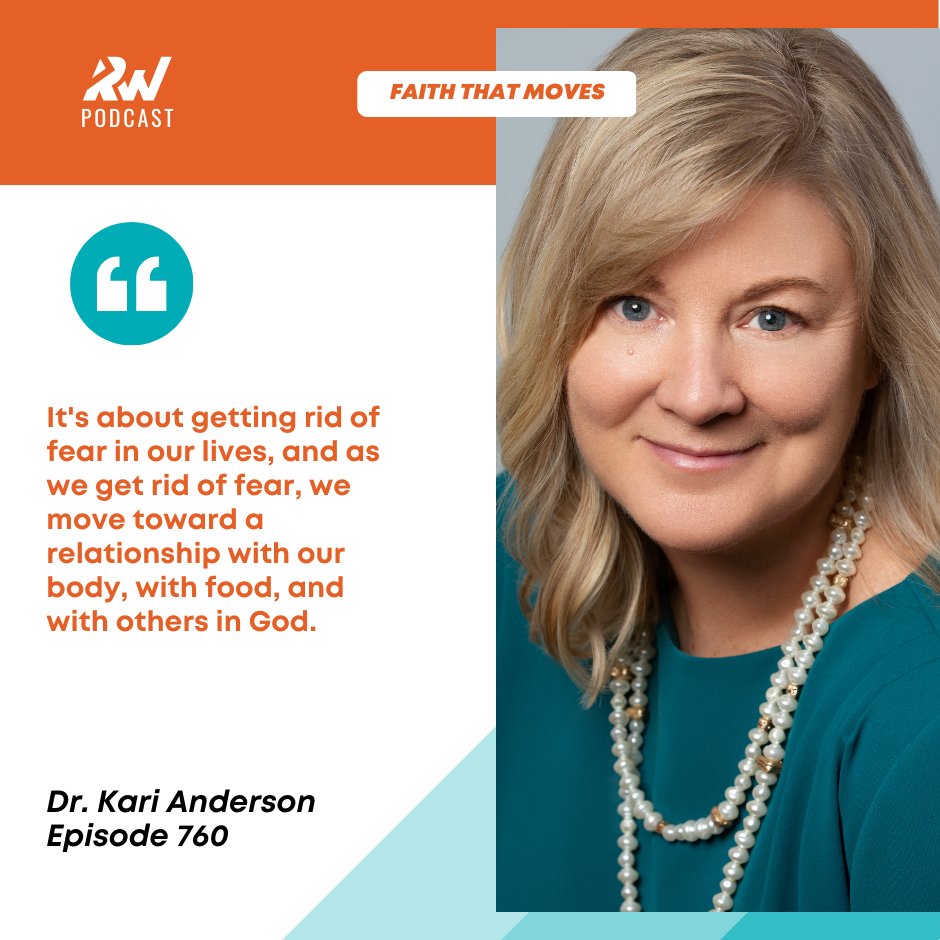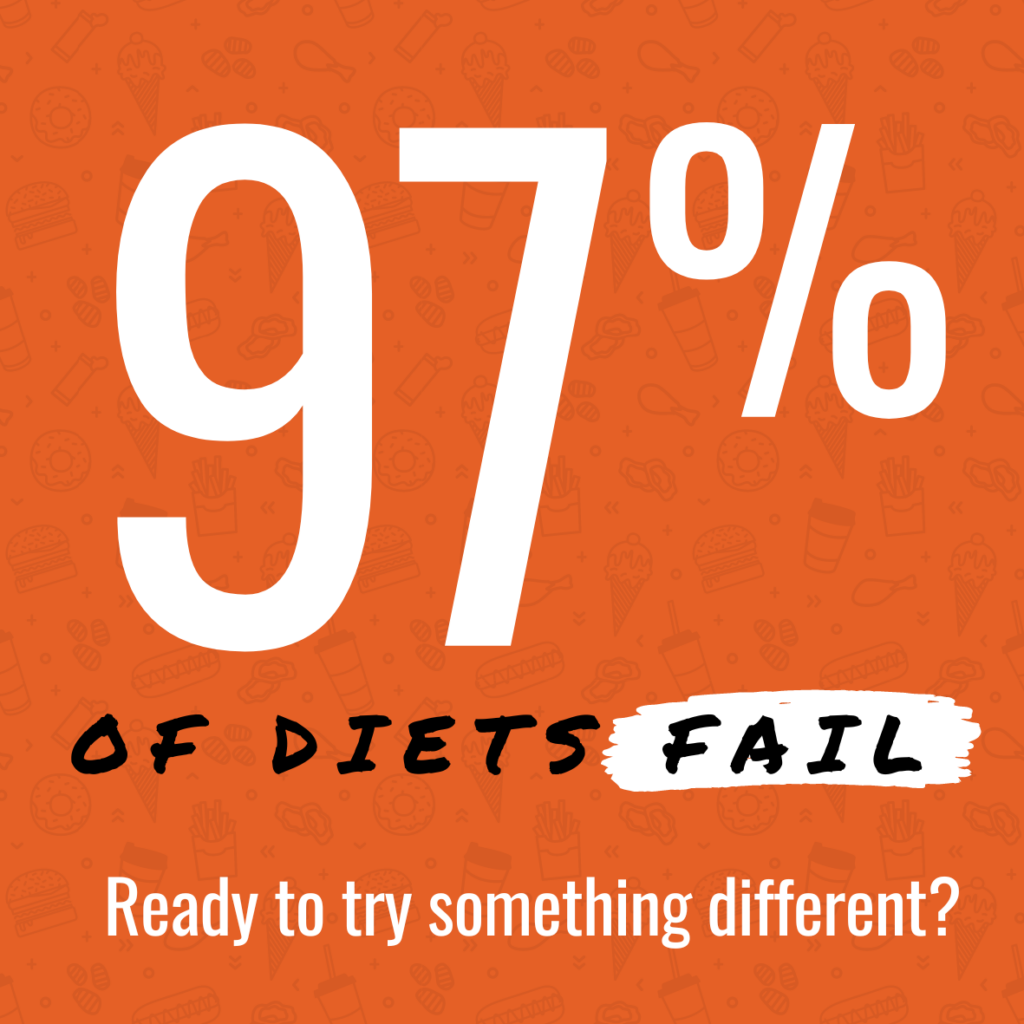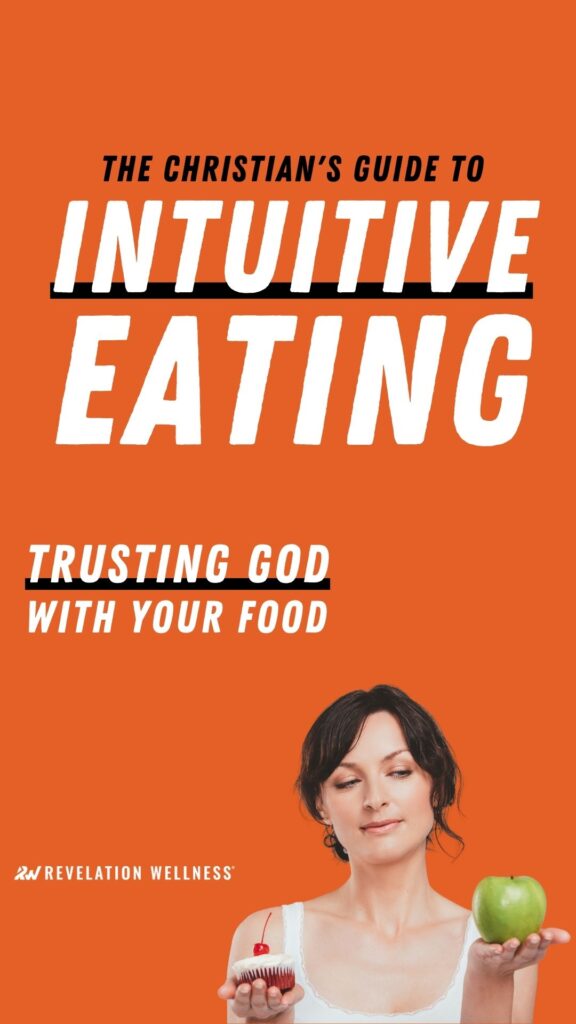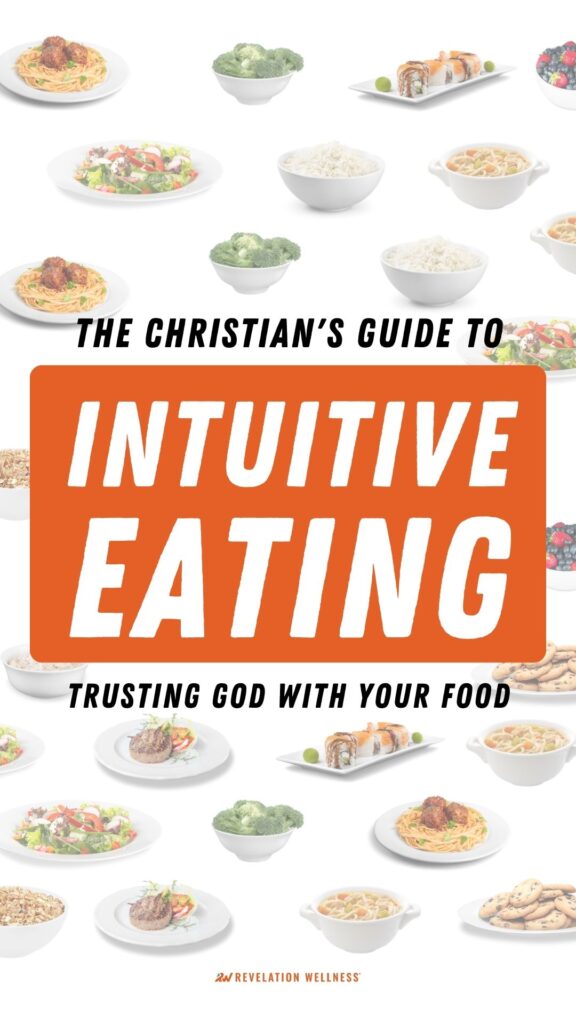
Intuitive Eating has been a well-researched approach to eating since 1995. In contrast to the low-calorie, low-carb diet fads of the day, the founders of Intuitive Eating, Tribole and Resch, wanted to share an approach to food that included all food groups and even invited you to enjoy the foods you were eating.
This whole-body health approach to food was revolutionary, and it’s still making waves today.
If you’re tired of dieting and you want to enjoy the body God designed, Intuitive Eating might be for you!
The Christian’s Guide to Intuitive Eating: Trusting God With Your Food will answer all your questions about Intuitive Eating, from “What is it?” to “Can I lose weight with Intuitive Eating?”
But that’s not all.
The point of Intuitive Eating isn’t just about a new way to eat. If you’ve been in diet culture for most of your life, Intuitive Eating can be a way to surrender your food choices and body image to the goodness of God. Because God cares about the whole you.
You won’t be looking at the world’s prescription for the perfect body anymore. Instead, you’ll trust God has made your body with specific needs that can be met with the help of the Holy Spirit.
Food doesn’t have to be the boss of you anymore. Tune into God’s voice and find food freedom!
21-Days To Food Freedom
Table of Contents
What is Intuitive Eating?

Intuitive Eating was founded in 1995 by two dietitians, Evelyn Tribole and Elyse Resch. According to the blog post “What is Intuitive Eating” by Evelyn Tribole,
“Intuitive Eating is an evidenced-based, mind-body health approach, comprised of 10 Principles and created by two dietitians, Evelyn Tribole and Elyse Resch in 1995. Essentially, Intuitive Eating is a personal process of honoring health by listening and responding to the direct messages of the body in order to meet your physical and psychological needs.”
Who is Intuitive Eating for?
Intuitive Eating is for:
– Someone open to trusting themselves and God with their food choices
– Someone who is finished with fad diets and constant restriction
– Someone who knows they have been given a good body but need the next step forward
– Someone who wants to enjoy life to the fullest and embody God’s sufficiency
– Someone who wants to love God with all their heart, mind, and strength
How do I become an Intuitive Eater?
Pause. Look at your surroundings for 30 seconds. Where are you? What do you see? What do you hear? What do you smell? What can you feel?
This, my friend, is a practice in attunement.
We can’t intuitively do anything unless we become attuned to what is going on inside of us. Intuitive Eating requires you to have attunement.
We have to practice to become Intuitive Eaters.
Here are four things you can do to set the foundation to become an intuitive eater:
1. Grow in Trust
2. Practice Your Observational Skills
3. S.O.A.P Yourself
4. Be H.O.L.Y
Preparing for Intuitive Eating Printable
What do Intuitive Eaters eat?

Christ-centered intuitive eaters eat to feel good in their bodies, minds, and spirits. They see all foods that God created as good and all foods as permissible (unless there is a food allergy, of course). However, one of the myths about Intuitive Eating is that you eat whatever you want, whenever you want, without listening to what your body needs. This is not true of Intuitive Eating.
As an intuitive eater, you learn to eat foods that bring you satisfaction (think taste, smell, appearance, temperature, texture, etc.) as well as make your body feel good. Intuitive Eating is multifaceted and involves listening to hunger and fullness, emotional needs, respecting your body, and eating without judgments about yourself or your food.
Most importantly, it’s about trusting the Holy Spirit and trusting that God made your body able to communicate its needs.
The world has set overwhelming and unattainable standards for our bodies through diet culture – we need something different! You may feel as if your personal relationship with food is complicated, but there is hope! We only need to train up our bodies and minds to lean in and learn to listen to the One who made us good.
Turn down the volume on diet culture and tune into God’s voice by joining our new program, Food Is Not the Boss of Me!
What does faith have to do with Intuitive Eating?

From Genesis through Revelation, we are reminded over and over again that God is the God of all good things. Your body is good. Food is good. Your body is made to do good things.
The practice of Intuitive Eating is to learn to trust yourself with the good things God has given you. It is the practice of getting in tune with how God made your body to function in the beginning.
Specifically, we learn how to properly use food to nourish our bodies without obsession or neglect. When we trust ourselves with the abundance of food God has provided, trusting God is good. You can say goodbye, forever, to anybody else’s opinion of you, your body, and what you should eat or drink.
What's the difference between Intuitive Eating and dieting?

What is the difference between intuitive eating and dieting?
The main difference between the two is that dieting uses external cues and measures from another “expert.” In contrast, intuitive eating (IE) uses God-given internal cues and measures, relying on the individual as the expert on their own body.
Dieting vs. Intuitive Eating
External Cues | Internal Cues
One-size-fits-all | Individualized
Rigid & Stringent | Flexible & ever-changing
Cause stress & anxiety | Eating is a pleasurable experience
Food is the enemy | Food is a gift from God
Physiological Focus | Whole-Person Approach
Promote self-hate | Promote self-compassion
Temporary success | Permanent reward
Can you lose weight with Intuitive Eating?

Here’s the thing. You don’t have to completely disregard the “weight” conversation in order to reject dieting and find food freedom. I want to validate your nervousness about weight and I want you to understand that there are so many layers to unpack when it comes to that one little word we all shy away from.
It’s a tender subject for many of us. Whether because of something someone said to us, because of cultural expectations, or because of what’s portrayed in the media, the weight of that word in itself is heavy to carry.
But the reality is this: bodies fluctuate. It’s just the way that it is. And when it comes to finding food freedom through Intuitive Eating, weight fluctuations are bound to happen. But what you may not realize is that you don’t actually have as much control over your weight as you think you do. It’s one of the many reasons that dieting is not a valid solution for wellness and why dieting actually sabotages us.
[Want to hear more? Listen to Jennifer Taylor Wagner speak about Intuitive Eating on the Revelation Wellness Podcast.]
Making Peace With Food

I first heard the term “Intuitive Eating” during a presentation on obsession and neglect at my Revelation Wellness Instructor Retreat. I felt led by the Holy Spirit to dig deeper into this concept and purchased the Intuitive Eating 4th edition book by Evelyn Trilobe & Elyse Resch, which outlines the concept of being aware of our eating patterns and being fully present.
I realized that if I continued to be at war with my body, it would be nearly impossible to be at peace with my relationship with food.
So, if you are like me and want to finally make peace with food try these four strategies.
[Want to know more? Listen to episode #752 Healing Your Relationship With Food on the Revelation Wellness Podcast.]
Interview with Dr. Kari Anderson on Interoception and Intuitive Eating

Interoception is essential to the practice of Intuitive Eating. When you eat intuitively, you recognize and respond to your body’s hunger and fullness cues, energy needs, and emotions with an appropriate amount of food or other tools to meet your needs.
To test your interoception skills, ask yourself, How do I feel in my body right now?
If you’re stumped, try a Be Still and Be Loved: Body Scan from the Revelation Wellness Podcast. Alisa will read Scripture over you and guide you to become aware of different parts of your body.
Find more tips for interoception on our blog post: Preparing for Intuitive Eating!
How do intuitive eaters exercise?

If you’ve embraced the intuitive eating philosophy, you’ve started paying more attention to your body when it comes to hunger and fullness. What if you could do the same with your body around exercise? What if, instead of being driven by the fear of gaining weight or living in pain but veiling it as gain, you could move for joy? And not just for joy, but by grace.
Principle Nine of Intuitive Eating is “Movement—Feel the Difference.” And the real difference between exercise and intuitive movement is to step away from focusing on using workouts to change how we want to look and instead use them as an opportunity to pay attention to how we feel. Many have gone a step further and run with the concept of “joyful movement.”
For the Christian, joy is the expression of grace, so the root of being able to move joyfully for us is centered upon, rooted in, and overflowing from the grace of God.
[Check out RevWell TV for access to hundreds of faith-based workouts for FREE!]

Do you feel like your relationship with food is complicated? Have you listened to the world’s opinions about what foods are “good” or “bad?” Do you find yourself using food to manage your emotions? Does food have control over your life?
If you don’t want food to be the boss of you, surrender your thoughts and invite the Holy Spirit into your life in a new way by focusing on the results that matter – the health of your heart, mind and soul – not your weight or any results a scale can measure. You are invited to join us for our new program, Food Is Not the Boss of Me: 21 Days to Food Freedom.














